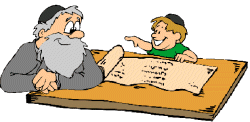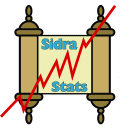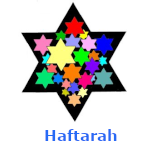VaYechi
וַיְחִי
Gen. 47:28 – 50:26
Jacob’s Last Days
Jacob made Egypt his home for 17 years. He lived to be 147 years old.
When Israel realized that he would soon die, he called for his son Joseph.
“If you really want to do me a kindness,” he said, “place your hand under my thigh. Act toward me with truth and kindness, and do not bury me in Egypt. Let me lie with my fathers. Carry me out of Egypt, and bury me in their grave.”
“I will do as you say,” replied Joseph.
“Swear to me,” said Jacob.
Joseph made an oath to him, and, from where he was on the bed, Israel bowed.
A short time after this, Joseph was told that his father was sick. Joseph went to his father, taking his two sons, Manasseh and Ephraim, along with him. When Jacob was told that Joseph was coming to him, Israel summoned his strength and sat up in bed.
Jacob said to Joseph, “HaShem once appeared to me in Luz, in the land of Canaan. He blessed me, and said to me, ‘I will make you fruitful and numerous, and have you give rise to an assembly of nations. I will give this land to you and your descendants as their property forever.’ Now, the two sons who were born to you in Egypt before I came here shall be considered as mine. Ephraim and Manasseh shall be just like Reuben and Simeon to me. Any children that you have after them, however, shall be considered yours. They shall inherit only through their older brothers. When I was coming from Padan, your mother Rachel died on me. It was in Canaan, a short distance before we came to Ephrath. I buried her there along the road to Ephrath (Bethlehem).”
Israel saw Joseph’s sons. “Who are these?” he asked.
“They are the sons that HaShem gave me here,” replied Joseph to his father.
“If you would, bring them to me,” said Jacob. “I will give them a blessing.”
Israel’s eyes were heavy with age, and he could not see. When Joseph brought his sons near him, Israel kissed them and hugged them.
“I never even hoped to see your face,” said Israel to Joseph. “But now HaShem has even let me see your children.” Joseph took the boys from near his father’s lap, and he bowed down to the ground. Joseph then took the two boys. He placed Ephraim to his right (to Israel’s left), and Manasseh to his left (to Israel’s right). He then came close to his father. Israel reached out with his right hand and placed it on Ephraim’s head even though he was the younger son. He placed his left hand on Manasseh’s head. He deliberately crossed his hands, even though Manasseh was the firstborn.
Jacob gave Joseph a blessing. He said, “HaShem before whom my fathers, Abraham and Isaac, walked, is the One who has been my Shepherd from as far back as I can remember until this day, sending an angel to deliver me from all evil. May He bless the lads, and let them carry my name, along with the names of my fathers, Abraham and Isaac. May they increase in the land like fish.”
When Joseph saw that his father had placed his right hand on Ephraim’s head, he was displeased. He tried to lift his father’s hand from Ephraim’s head and place it on Manasseh’s.
“That’s not the way it should be done, Father,” said Joseph. “The other one is the first-born. Place your right hand on his head.”
His father refused and said, “I know, my son, I know. The older one will also become a nation. He too will attain greatness. But his younger brother will become even greater, and his descendants will become full-fledged nations.”
On that day Jacob blessed them. He said, “In time to come Israel will use you as a blessing. They will say, ‘May HaShem make you like Ephraim and Manasseh.’” He deliberately put Ephraim before Manasseh.
Israel said to Joseph, “I am dying. HaShem will be with you, and He will bring you back to your ancestral land. In addition to what your brothers shall share, I am giving you Shechem, which I took from the Amorite with my sword and bow.”
Jacob’s Blessings
Jacob called for his sons. When they came, he said, “Come together, and I will tell you what will happen in the course of time.
Come and listen, sons of Jacob; listen to your father Israel. Reuben, you are my firstborn, my strength and the beginning of my manhood, first in rank and first in power. But because you were unstable as water, you will no longer be first. This is because you moved your father’s beds, committing a profane act. He moved my bed! Simeon and Levi are a pair; instruments of crime are their wares. Let my soul not enter their plot; let my spirit not unite with their meeting – for they have killed men with anger, maimed bulls with will. Cursed be their rage, for it is fierce, and their fury, for it is cruel. I will disperse them in Jacob, scatter them in Israel.
Judah, your brothers shall submit to you. Your hand shall be on your enemies’ necks; your father’s sons shall bow to you. Young lion, Judah, you have risen from prey, my son. He crouches, lies like a lion, like an awesome lion, who will dare rouse him? The scepter will not depart from Judah, nor legislation from his descendants. Nations will submit to him until the final tranquillity comes. He loads down his donkey with a single grapevine, his young donkey with a single vine branch. He even washes his clothes in wine, his cloak in the blood of grapes. But his eyes are more sparkling than the wine, his teeth whiter than milk.
Zebulun shall settle the seashores; he will be a harbor for ships; his border shall reach Sidon.
Issachar is a strong-boned donkey, stretching out between the saddlebags. But he sees that the resting place is good, and that the land is pleasant, so he will bend his back to the load, working like a slave.
Dan shall fight for his people, like any one of the tribes of Israel. Let Dan be a snake on the road, a viper on the path, biting the horse’s heel, so the rider falls backward. I pray that HaShem will help you.
Raiders shall raid Gad, but he will raid at their heel.
From Asher shall come the richest foods; he shall provide the king’s delights.
Naphtali is a deer running free; he delivers words of beauty.
Joseph is a fruitful son, like a fruitful vine by the fountain, with branches running over the wall. People made his life bitter and attacked him; masters of strife made him their target. But his resolution remained firm, and his arms were eventually decorated with gold. This was from Jacob’s Champion, and from then on, he became a shepherd, a builder of Israel. This was from your father’s HaShem, who will still help you, and from the Almighty, who will bless you. Yours will be the blessings of heaven above, the blessing of the water lying beneath, the blessing of breast and womb. May your father’s blessing add to the blessing of my parents, lasting as long as the eternal hills. May they be for Joseph’s head, for the brow of the elect of his brothers.
Benjamin is a vicious wolf. He eats a portion in the morning, and divides his prey in the evening. ” All these are the tribes of Israel, twelve in all, and this is what their father said to them when he blessed them. He gave each one his own special blessing.
Jacob Dies
“I am going to join my people in death,” he said. “Bring me to my fathers, to be buried in the cave in the field of Ephron the Hittite. This is the cave in Makhpela Field, bordering Mamre, in the land of Canaan. Abraham bought it along with the field from Ephron the Hittite as burial property. This is where Abraham and his wife Sarah are buried; this is where Isaac and his wife Rebecca are buried; and this is where I buried Leah. The purchase of the field and its cave from the children of Heth is still recognized.”
Jacob thus concluded his instructions to his sons. He drew his feet back onto the bed, breathed his last, and was brought back to his people.
Joseph fell on his father’s face. He wept there and kissed his father. Joseph then ordered his servants, the physicians, to embalm his father. The physicians thus embalmed Israel.
It took forty days, since that was the time required for embalming. Egypt mourned Jacob for seventy days. When the period of mourning of Jacob was over, Joseph addressed Pharaoh’s court and said, “If you would do me a favor, give the following personal message to Pharaoh: “My father bound me by an oath and he declared, “I am dying. You must bury me in the grave that I prepared for myself in the land of Canaan.” Now, if you allow me, I will head north and bury my father. I will return.”
“Go bury your father,” said Pharaoh, “just as he had you swear.”
Joseph headed north to bury his father, and with him went all of Pharaoh’s courtiers who were his palace elders, as well as all the other elders of Egypt.
All of Joseph’s household, his brothers, and his father’s family also went. All they left behind in Goshen were their small children, their sheep and their cattle. A chariot brigade and horsemen also went with them. It was a very imposing retinue. They came to Bramble Barn (Goren HaAtad) on the bank of the Jordan, and there they conducted a great, imposing funeral. Joseph observed a seven day mourning period for his father. When the Canaanites living in the area saw the mourning in Bramble Barn, they said, “Egypt is in deep mourning here.” The place on the bank of the Jordan was therefore called Egypt’s Mourning (Avel Mitzraim). Jacob’s sons did as he had instructed them.
His sons carried him to Canaan, and they buried him in the cave of Makhpelah Field, bordering Mamre. This is the field that Abraham bought for burial property from Ephron the Hittite. After he buried his father, Joseph returned to Egypt along with his brothers and all those who went with him to his father’s burial. Joseph’s brothers began to realize the implications of their father’s death.
“What if Joseph is still holding a grudge against us?” they said. “He is likely to pay us back for all the evil we did him.”
They instructed messengers to tell Joseph: “Before he died, your father gave us final instructions. He said, This is what you must say to Joseph: Forgive the spiteful deed and the sin your brothers committed when they did evil to you.” Now forgive the spiteful deed that we, the servants of your father’s G-d, have done.”
As the messengers spoke to him, Joseph wept. His brothers then came and threw themselves at his feet. “Here!” they said, “We are your slaves!”
“Don’t be afraid,” said Joseph to them. “Shall I then take HaShem’s place? You might have meant to do me harm but HaShem made it come out good. He made it come out as it actually did, where the life of a great nation has been preserved. Now don’t worry. I will fully provide for you and your children.” He thus comforted them and tried to make up.
Joseph remained in Egypt along with his father’s family. He lived to be 110 years old. Joseph saw Ephraim’s grandchildren, and the children of Manasseh’s son Makhir were also born on Joseph’s lap.
Joseph said to his close family, “I am dying. God is sure to grant you special providence and bring you out of this land, to the land that he swore to Abraham, Isaac and Jacob.”
Joseph then bound the Israelites by an oath: “When HaShem grants you this special providence, you must bring my remains out of this place.”
Joseph died at the age of 110 years. He was embalmed and placed in a sarcophagus in Egypt.
Haftarah Connection

I Kings 2.1-12
This week’s Parsha Isaac gathers his children around him before he dies. He blesses them and makes his final request.
In the Haftara King David is also nearing death and calls for his successor, Solomon, he tells him to continue on his path with HaShem and makes his final requests.
Sidra Stats

- Twelveth of 54 Sedras in the Torah
- Written on 148 lines in the Sefer Torah
- 85 P’sukim (verses)
- 1,158 words
- 4,448 letters
Next week’s Parashat: Shemoth


